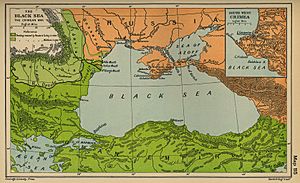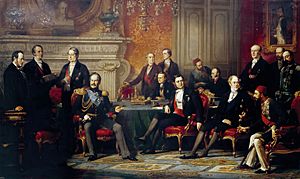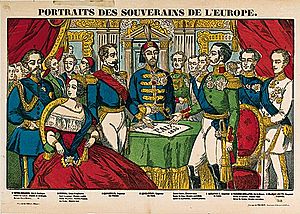Congress of Paris (1856) facts for kids
The Congress of Paris was a series of important meetings held in 1856 in Paris, France. Its main goal was to make peace after the Crimean War. This war had been going on for almost three years.
Diplomats from many countries attended the Congress. These included France, Great Britain, Russia, Austria, and Prussia. Representatives from the Ottoman Empire and Piedmont-Sardinia were also there. The French Prime Minister, Alexandre Colonna-Walewski, led the meetings. The agreement helped the Ottoman Empire stay independent. It also returned Russia and the Ottoman Empire to their old borders.
Contents
Why the Congress of Paris Happened
The Crimean War was fought mainly on the Crimean Peninsula. Russia fought against Great Britain, France, the Ottoman Empire, and Piedmont-Sardinia. There were a few main reasons for the war.
One reason was Russia's demand to protect Orthodox Christians in the Ottoman Empire. The Ottoman leader, called the Sultan, promised to treat them better at the Congress of Paris.
Another reason was a disagreement between Russia and France. They argued about the rights of Russian Orthodox and Roman Catholic Churches in Palestine.
Behind the scenes, other interests were at play. The peace treaty included important agreements. The Black Sea became neutral, meaning no warships were allowed there. Building forts was also forbidden. The Danube River was opened for ships from all nations.
An important separate agreement was also made. It was called the Paris Declaration Respecting Maritime Law. This agreement set out basic rules for naval warfare. Many nations later agreed to these rules.
The Sultan declared war on Russia on October 4, 1853, with support from Britain and France. On March 28, 1854, Britain and France also declared war on Russia. Later, on January 26, 1855, Piedmont-Sardinia joined the war. They sent 10,000 soldiers to help Britain and France.
During the war, Russia was very worried about the Austrian Empire. Austria threatened to join the war against Russia. This threat helped bring an end to the fighting.
The Congress Meetings
France, Great Britain, Russia, Austria, Prussia, and the Ottoman Empire were seen as the most powerful countries in Europe at that time. All of them sent representatives to the Congress. Piedmont-Sardinia, as a country that fought in the war, also had a seat.
The meetings started soon after February 1, 1856. This was when Russia accepted the first peace terms. Russia agreed after Austria threatened to join the war. The Congress was held in Paris. It happened right after the 1855 World's Fair.
The Congress of Paris worked out the final peace terms from February 25 to March 30, 1856. The Treaty of Paris was signed on March 30, 1856. It was signed by Russia on one side, and France, Great Britain, Turkey, and Piedmont-Sardinia on the other. The signing took place at the Quai d'Orsay.
Important representatives attended the Congress. Mehmed Emin Âli Pasha, the Ottoman Empire's top minister, was there for the Ottomans. Prince Orlov and Baron Brunnov represented Russia. Britain sent Lord Cowley, their ambassador to France.
The Congress of Vienna (1814) was a much larger meeting with over 200 nations. It needed many committees to solve problems. The Congress of Paris, however, solved everything quite quickly.
Piedmont-Sardinia achieved a big diplomatic win. Even though it wasn't a "great power," French Emperor Napoleon III gave it a seat. This was mainly because Piedmont-Sardinia sent 18,000 soldiers to fight Russia. Their foreign minister, Camillo Benso di Cavour, used this chance to speak out. He criticized Austria's actions in the Italian Peninsula. He said Austria was stopping Italians from choosing their own government.
Peace Agreements from the Congress

The Congress led to all powers promising to protect the "integrity of the Ottoman Empire." This meant they would guarantee its independence.
Russia also gave up land near the mouth of the Danube River. This included part of Bessarabia, which went to Moldavia. Russia also gave up its claim to specially protect Christians in the Ottoman Empire. Moldavia and Wallachia, which later became Romania in 1858, along with Serbia, were recognized. They became self-governing areas protected by other European powers. In return, the Ottoman Sultan agreed to improve the lives of Christian people in his empire.
The borders of Russia and the Ottoman Empire went back to how they were before the war. The Black Sea was made neutral. This meant no warships could enter it, but it was open for all other nations. The Danube River was also opened for shipping from all nations.
After signing the peace treaty, the diplomats agreed on a new declaration. This declaration set rules for naval warfare during wartime. It was based on an agreement between France and Britain from 1854. These two big naval powers had different ideas about sea warfare. As allies for the first time, they needed common rules. They agreed not to take enemy goods on neutral ships. They also agreed not to take neutral goods on enemy ships. They would also not allow private ships to attack enemy ships for profit.
The Declaration agreed upon at the Congress of Paris covered four main points:
- Privateering (private ships attacking enemy ships for profit) was stopped forever.
- A neutral flag protects enemy goods, except for war supplies.
- Neutral goods, except for war supplies, cannot be captured on an enemy's ship.
- Blockades (stopping ships from entering or leaving a port) must be real. They must have enough force to truly block access to the enemy's coast.
Great Britain, Austria, France, Prussia, Russia, Sardinia, and Turkey signed this Declaration.
This treaty was a big step in international law. For the first time, countries not involved in making the agreement could join it later. Soon after it was signed, 55 states, royal families, and free cities agreed to the Declaration. This helped make international law more global.
What Happened After
Some historians from Turkey still feel that the Ottoman Empire did not gain enough. Even though they were on the winning side, they lost the right to have a navy in the Black Sea, just like Russia. They became part of the European group of nations. However, they were not seen as a major power that could ask for more land if another country gained territory.
The agreements made at the Paris Congress fell apart after France lost the 1870-1871 Franco-Prussian War. After France lost hope of winning, Russia announced it would no longer follow the treaty's terms. The Russian Foreign Minister, Alexander Gorchakov, said on October 31, 1870, that Russia would not follow the Black Sea rules. This was later confirmed by the Treaty of London (1871).
Some of these rules and agreements were later changed by the Congress of Berlin.
 | Tommie Smith |
 | Simone Manuel |
 | Shani Davis |
 | Simone Biles |
 | Alice Coachman |



